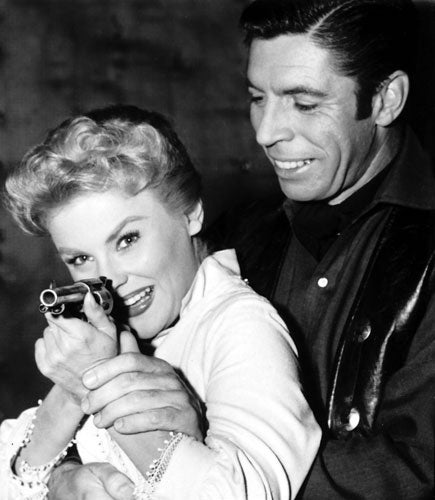Michael Pate: Actor, writer and director whose film 'Tim' launched Mel Gibson

The Australian actor, writer, producer and director Michael Pate had an enormously prolific career – he was in such demand in 1953 that Columbia Pictures wrote to the director of the film El Alamein, in which he was appearing, asking him to "Please kill Michael Pate before noon". But he is possibly best remembered as the writer, producer and director of the popular film Tim (1979) which gave Mel Gibson, who played a handsome but backward young man who is nurtured by a middle-aged woman (Piper Laurie), his first major opportunity.
Pate was also the first actor to portray James Bond's CIA counterpart Felix Leiter (transformed into an MI6 agent) in a live 1954 television version of Casino Royale starring Barry Nelson as "Jimmy" Bond, with Peter Lorre a formidable villain. In a long-running television series, Matlock Police (1971-75), Pate played a country detective, and he won several awards for his productions of both dramatic and variety shows for Australian television. In 1990 he received the Medal of the Order of Australia for his services to the performing arts.
Born Edward John Pate in Sydney in 1920, he performed in pantomimes and in the school choir as a boy, and on graduation from Fort Street Boys High he joined the Australian Broadcasting Commission as an actor and writer, as well as writing a volume of short stories. He made his professional stage debut in 1938 in Elizabeth and Essex at Sydney's Minerva Theatre.
After serving in the Army's entertainment unit during the Second World War, during which he served as compere for the touring performances of Gracie Fields, he began to act in films, and in 1950 he supported Tommy Trinder and Chips Rafferty in Bitter Springs. Telling of the conflict between settlers and Aborigines, it was the last (and least successful) of the three films made in Australia by Ealing Studios after the war.
Pate also acted in a stage version of Charlotte Hastings' thriller, Bonaventure (1950), and he made his Hollywood debut when Universal asked him to repeat his role in Douglas Sirk's enjoyably melodramatic screen version of the play, retitled Thunder on the Hill (1951) and starring Claudette Colbert as a nun turned sleuth, proving the innocence of convicted murderer Ann Blyth. Pate remained in the USA for several years, appearing in more than 200 films and TV shows. He was Flavius to Marlon Brando's Marc Antony in Julius Caesar (1953), played a droll Sir Locksley in Danny Kaye's funniest comedy, The Court Jester (1955), and was frequently cast as a Native American in such films as Hondo (1953) and The Great Sioux Massacre (1965) and countless television westerns including Maverick, Laramie, Have Gun – Will Travel, Gunsmoke and a memorable episode of Rawhide in which he saved the stars, Eric Fleming and Clint Eastwood, from being flogged while tied to tree trunks.
Pate had had a short-lived wartime marriage, but, after his divorce he wed the actress Felippa Rock, daughter of the film producer Joe Rock, in 1951, and with her brother, Philip Rock, Pate wrote the screenplay for the Western Escape from Fort Bravo (1953). In 1959 he returned to the stage with Judith Anderson in Medea, and in the same year he was a priest in Green Mansions, starring Audrey Hepburn. In 1968 he returned to Australia, where he produced Age of Consent, starring James Mason and a then little-known Helen Mirren, whose nude scenes boosted the film's takings in Australia, but were edited out by British censors.
Mel Gibson was also little known when Pate cast him in Tim (1979), based on a book by Colleen McCullough. Pate gave the tricky subject – a middle-aged woman teaching a youth with learning difficulties and ultimately marrying him – delicate handling, which resulted in a tasteful and touching tale. Pate won a Best Screenplay award from the Australian Writers' Guild, and Gibson won the Australian Film Academy award as best actor for his performance – later the same year he gained international fame with Mad Max.
In 1982-84 Pate toured Australia co-starring with his son Christopher Pate in Mass Appeal, ending with a season at the Sydney Opera House. Though he retired in 2001, Pate was working on a script at the time of his death.
Tom Vallance
Michael Pate, actor, director and writer: born Drummoyne, New South Wales, Australia 26 February 1920; married twice (one son); died Sydney, New South Wales, Australia 1 September 2008.
Join our commenting forum
Join thought-provoking conversations, follow other Independent readers and see their replies
Comments
Bookmark popover
Removed from bookmarks